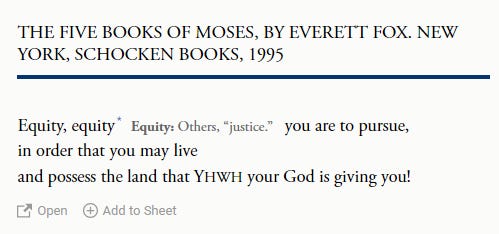On the Parasha: Tzedek Tzedek Tirdof
A quick thought on the parasha.
In Re`eh, we read
צֶ֥דֶק צֶ֖דֶק תִּרְדֹּ֑ף לְמַ֤עַן תִּֽחְיֶה֙ וְיָרַשְׁתָּ֣ אֶת־הָאָ֔רֶץ אֲשֶׁר־יְהוָ֥ה אֱלֹהֶ֖יךָ נֹתֵ֥ן לָֽךְ׃ (ס)
“Justice, Justice you shall pursue.”
Why the repetition? There are many derashot on this, where iterating through potential reads can give many wonderful ideas. For instance:
If you need to retry a case even after the verdict has been finalized, you should do it.
Pursuing justice should be performed only in a forthright tzedek manner. No subverting due process to get a desired result.
On a peshat level, the poetic repetition, what we might call for the verb the geminated imperative, may be a form of encouragement. See here:
The Torah Speaks in Human Language (recent article summary)
Recently, I wrote an article about Dibra Torah, that the Torah Speaks in Human Language. You can read it here: paid Substack, Jewish Link HTML, flipdocs. Or click on the image.
Whenever you add, you are taking away. Kol hamosif gorea. So there is regular justice, in which everyone is treated equally under the same law. The rich and poor, the friend and stranger. Lo takir panim bamishpat. Then, there is justice with adjectives, such as social justice, climate justice, which can be results-driven and may show partiality to certain groups.
So, what kind of tzedek? The tzedek kind!
By the way, here are some Sefaria translations. Any takeaways about translators’ attitudes?
Is equity the same as equality? Regardless, is this results driven?





